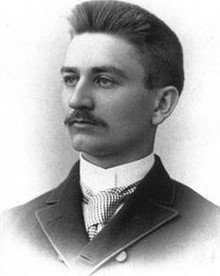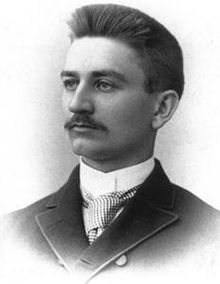The Bromine Gambit

Bromine — number 35 on the Periodic Table of the Elements — is, as Wikipedia describes, “a fuming red-brown liquid at room temperature that evaporates readily to form a similarly colored gas.” Today, we use it mostly as a flame retardant; brominated materials, when burned, create a chain reaction which ultimately releases a fire suppressant. And more than a century ago, bromine was even more valuable — it was commonly used medically, as both a sedative and as an anticonvulsant.
And it made the man below very rich — despite the best efforts of a German cartel.

That’s a picture of Herbert Henry Dow, the founder of Dow Chemical. As of this writing, Dow Chemical is a multi-national corporation with a market capitalization of more than $60 billion. But it had to start somewhere. In this case, Mr. Dow founded the self-named company in 1897, and bromine was a key reason why the company which now bears his name found early success. In 1891, Mr. Dow developed and patented a method of extracting bromine from brine — very salty salt water, effectively — now called the “Dow process.” The Dow process ultimately allowed Mr. Dow to produce bromine cheaper than anyone else, and that should have given him a competitive advantage. But the rest of the world wasn’t so kind.
Before Dow came onto the bromine scene, a German government-backed cartel named the Bromkonvention had a monopoly on bromine. As Investopedia explains, the Bromkonvention “sold bromine at a fixed price of 49 cents per pound, but it would implement a predatory pricing strategy quickly, if challenged.” And Dow Chemical posed such a challenge.
Dow Chemical operated independently of the Bromkonvention, which didn’t make the Germans all that happy, but they were willing to coexist so long as Dow kept its bromine sales within the United States. And considering that Dow was selling bromine at 27 cents per pound — about 45% less than what the Bromkonvention priced it at in Europe — the Germans saw Dow as a real threat. So the Bromkonvention made a threat of their own: if Dow entered markets outside the United States, the Bromkonvention promised to use its huge supplies of bromine to force Dow out of business by selling it cheaply — below cost — in the States.
Dow called their bluff, selling bromine to England. And the Bromkonvention retaliated. The cartel began dumping bromine in America, offering it for sale at 15 cents per pound. Dow couldn’t compete, and it didn’t have any other products to make up for the shortfall. This put Dow’s business in jeopardy — in theory at least.
In practice? Something went wrong, at least from the perspective of the Bromkonvention. American demand for bromine went up, as expected, but by leaps and bounds — no matter how much bromine Bromkonvention sold there, it would sell out, and Dow was still able to find customers at its 27 cents/pound price point. Not only did Dow not go out of business, but it expanded. Dow began selling its bromine — still at 27 cents per pound — in Germany itself.
How was this possible? Instead of dropping its price to meet that set by the Bromkonvention, Dow became buyers, as Investors Business Daily (via the Indianapolis Recorder) explains: “[Herbert Henry Dow] had an agent secretly buy up hundreds of thousands of pounds of the cut-rate imported bromine.” And what do you do with that bromine? IBD continues: Dow would then “repackage [the cheap bromine] and export it back to Europe.”
The Bromkonvention, at first, wasn’t sure where the cheap European bromine was coming from; in that interim period, they also continued their price war against Dow and continued to lower the price in the U.S. (ultimately to 10 cents/pound). In the end, there wasn’t a price low enough to force Dow out of business, as Dow was well-enough capitalized to buy up the dumped bromine and arbitrage its way to success. (And besides, the Bromkonvention made it easier and easier by lowering the price.) A century plus later, Dow is still around; the Bromkonvention is long gone.
Bonus fact: Google “Bromkonvention ” and you’ll get a few results highlighting the story above, but you may also may get a suggestion “Did you mean: Brony Convention” (as seen here). A “Brony Convention” is a gathering of adult, typically male fans of “My Little Pony.” (Per Wikipedia, the term “brony” is “a portmanteau of ‘bro’ and ‘pony.'”) In the summer of 2015, BronyCon — the largest Brony Convention there is — attracted more than 10,000 bronies to Baltimore.
From the Archives: The Real Effect of Fake News: A Dow Chemical story.
Related: Rainbow Dash knee socks (with wings). (Read the top comment.)
